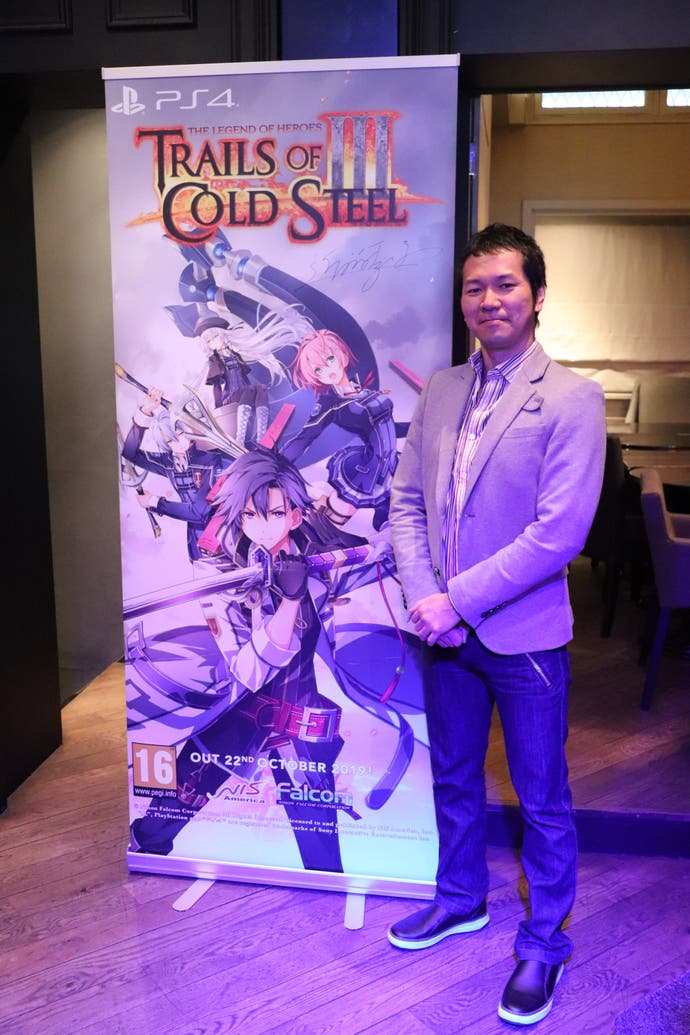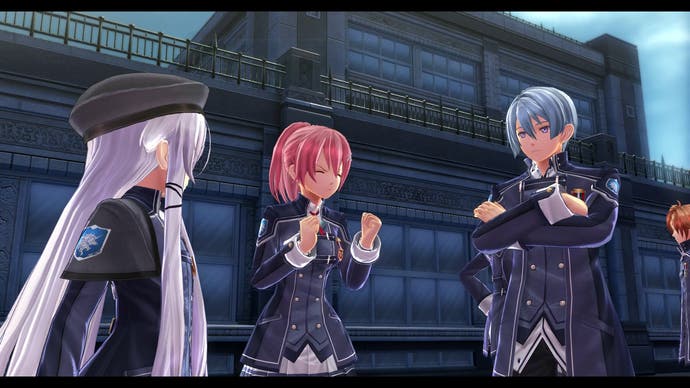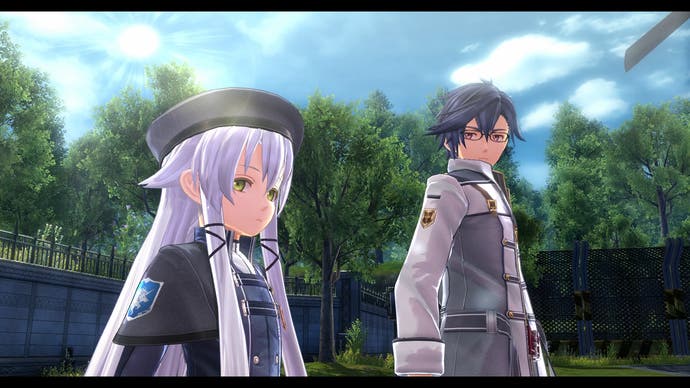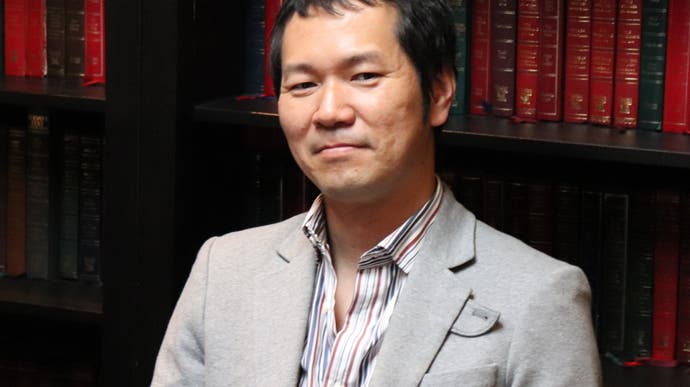Hot on the Trails of Falcom, Japan's longest-running RPG developer
Steel yourself.
Founded in 1981, Falcom is the longest-running RPG developer in Japan, even though it's dwarfed by its closest rivals in terms of size, production values, and international recognition. Today, the company remains a modest size of 62 employees, perhaps attributed to its founder Masayuki Kato, who often joked that he didn't want to make it any bigger because he didn't really like people. But when you've been through nearly four decades facing as much turbulence as the Japanese games industry has, there must be a secret to Falcom's longevity.
For its president Toshihiro Kondo, it's definitely the company's dedication to story, especially for the Trails series (or Kiseki as it's known in Japan), with Trails of Cold Steel 3 arriving on PS4 this October 22nd. "When we started out, we had the advantage in terms of pixel art," he tells me through his interpreter. "But as time progressed, other companies began putting a lot more manpower into graphics. We realised we'd need well over 100 people solely focused on that. But our founder [Kato] realised if we can get a writer who knows how to write good stories, and is able to build up their knowledge as a writer, that's something we can make a sales point going forward."

This began with 1994 title The Legend of Heroes 2: Prophecy of the Moonlight Witch, which Kondo refers to as the roots of the Trails series. From thereon, it's evident just how much emphasis is placed on story in Falcom's games based on the text. The script size for Trails of Cold Steel 3 is over 1.6 million Japanese characters, the largest of any Trails game released so far - for comparison, The Witcher 3's script contains over 450,000 words, while the entirety of the The Lord of the Rings books (including The Hobbit) add up to over 570,000 words).
I don't bring up Tolkien lightly, because the rich complex sociopolitical history and world-building of the Trails series is easily comparable to Middle Earth. Unlike say Final Fantasy or Dragon Quest, which usually take place in separate worlds and stories, the Trails series are all part of a grand intertwining narrative - which Kondo estimates they are about 60 per cent of the way through - and the same could be said of Falcom's flagship franchise Ys, which has always starred redhead Adol Christin in an ongoing adventure, albeit occasionally mixing up its chronology.
It's arguably this continuity that retains Falcom's small but fiercely loyal fanbase. "We don't make the kinds of products like Naruto or One Piece that is accepted by everybody," admits Kondo. "But the people who do love our games, they really love them! If you go to any company or school, or anywhere, you're sure to find one or two people who are incredibly hardcore fans of ours. And these are the kinds of fans that are with us for life."
That's not to say Falcom isn't trying to expand its audience, having also ported the first two Trails of Cold Steel games to PS4 this year ahead of the latest instalment. There's also a careful consideration with ensuring the series' long complex backstory isn't lost on newcomers. While some of this is done with in-game encyclopedias, special attention is also paid to the characters' lines. "Rather than just referencing an event that happened in the past and expecting the player to know, we try to make sure that there's always a bit of an explanation," Kondo explains. "We didn't want people to feel left out, so we put a lot of care into that."

Trails of Cold Steel 3 especially benefits with a new setting and cast. While the protagonist is still Rean Schwarzer, he's gone from being a student at the elite Thors Military Academy to an instructor at its branch campus in the town of Leeves, where he heads up a brand new Class VII. Rather than a retread of his former class, set up as a social experiment in mixing nobles and commoners, this Class VII is a made up of a more mismatched bunch of outsiders - what one character bluntly calls a 'trash bin'. Moreover, from Rean's new position, he's able to explain things to his students, and in turn new players naturally learn with them.
It's not just about making the story more accessible but also the gameplay, such as how Rean can issue Brave Orders, which act as party buffs intended to make turn-based battles less of a grind, while a new Break system cribbed from Ys 8 means exploiting enemy weaknesses allow for follow-up attacks to speed things up. More noticeable is how commands are mapped to individual buttons rather than menus, which seems directly influenced by Persona 5's UI, an observation that makes Kondo laugh ("That might have been our goal!").
Benefits of a smoother experience also stem from the PS4 hardware this game has been made exclusively for (although other platforms have not been ruled out). "This series is very anime-esque," says Kondo. "So thanks to the PS4, we're better able to express emotes and actions from an anime perspective." The impact has also been felt in the ports of the first two games, particularly with cutting down loading times, though perhaps the most welcome addition is the inclusion of dual audio.

As it turned out, the lack of Japanese audio in the original localisations had been the decision of global publisher Xseed. "I don't know why they made their decision," explains Kondo. "But I do know that when we spoke with NIS America [global publisher of Trails of Cold Steel 3], they were very adamant about giving [dual audio] to the fans. It's actually a very easy feature for us to implement, so going forward, should we be informed that's what they want, then we're happy to accommodate."
This does highlight the challenge a Japanese developer like Falcom faces: how to get its games to international fans, if at all. Even as Kondo speaks about not wanting to leave people out, it's hard to ignore the fact that Western audiences have already been left out with regard to two Trails games that were never localised, Zero no Kiseki and Ao no Kiseki.
Then there's the long wait of getting these games. Trails of Cold Steel III arrives in the West two years after its Japanese release, while the fourth instalment actually wrapped up the whole Erebonia arc last year (incidentally, the week this interview took place also saw the release of Ys 9 in Japan). Nowhere as long as the seven years it took for the first Trails of the Sky to be localised, but it's certainly frustrating when the big players like Nintendo and Square Enix aim at simultaneous launches for their major titles, while in recent years Atlus have really been closing the gap in turning around localisations of beloved Japanese titles like Persona and Sega's Yakuza series.
Ultimately, it's something Falcom lack the resources and language expertise to handle in-house. Of course, just by flying all the way to London for this interview, Kondo demonstrates how he does care about communicating with the global audience, but relying on third parties to get Falcom's games out to the rest of the world is really the only solution a company of its size has for the foreseeable future.
"To be honest, we'd much rather be making new games," he says candidly. "If we had to worry about localisation, it would cause us to stop working on the next game in order to finish localisation. And so it's very important to us that we keep on making new games for the series."
Entrusting localisation to a publisher is not without its own risks, as demonstrated by the backlash to NISA's work on Ys VIII, resulting in a complete script rewrite and patching months after release, which is why fans are understandably nervous about the quality of Trails of Cold Steel III's localisation. Nonetheless, I also wondered if there was a way to speed up the process, such as partnering with publishers earlier in the process.
"The truth of the matter is that, pretty much until we go to master, we're still working on the game," Kondo explains. "It's not uncommon for not only lines but sometimes even systems to be changed towards the very end. I guess it's characteristic of our staff because we love our work so much that we want to make it better and better until the very last minute. But that is obviously something that affects when we can start talking to people to start the localization process, and we can't reasonably expect our partners to work on a product that's not actually finished yet."
Unfortunately, this doesn't answer the fate of Zero no Kiseki and Ao no Kiseki although Kondo hints that he would like to see the older Trails games come to modern platforms so that new fans can experience the entire series, perhaps as full 3D remakes. Falcom is certainly no stranger to remakes, notably with Ys & 2, which is included with the upcoming TurboGrafx-16/PC Engine Mini. Nonetheless, while plenty of JRPGs are getting the re-release/remake treatment, it's not really a priority for Falcom. "The thing is that if we focus too much on remaking older games, that doesn't allow us to make new games," says Kondo. "So we have to really think carefully about how to balance all that."
Since becoming company president in 2007, moving forward with Falcom's future has been at the forefront of Kondo's mind, especially with the company's switch from PC to console development after its 2008 action-RPG Zwei 2 set the record for the lowest number of units shipped for PC games.

While PlayStation is currently its focus, the company is also paying attention to Stadia as a portable platform with lots of potential. I also mused on whether Falcom would ever become a PC-first developer again, perhaps on the Epic Games Store - although Epic have yet to sign any Japanese developers to its digital storefront. It did however present an opportunity to gauge whether there was any interest in following other Japanese developers in moving to Unreal Engine.
"We've actually had Epic come in the past to give us a walkthrough of Unreal," says Kondo. "I don't want to say bad things about any company's engine, but when you're using a different engine, and problems arise, it's often difficult to figure out if this a problem on our side or with the engine. That could take a lot of time and energy."
The Trails of Cold Steel games have been made with PhyreEngine developed by Sony, which hasn't been without its issues. "To give a very specific example in Trails of Cold Steel 3, there's a part where 40 different character models are on screen at the same time," he explains. "PhyreEngine is not really equipped to support that, so internally, we have to adjust the coding and adjust the engine to make this happen. It turns out that this extra trouble isn't so much more work than making our own engine to begin with."
There's actually a split between the team's veteran programmers who would rather make their own engine while the younger staff question why they don't just use Unreal. Kondo laughs, "Even within the company, we can't come to a consensus!"
In any case, the future for Falcom looks optimistic. "Just like James Bond, the Trails series will continue," says Kondo. perhaps inspired by being in London. Whether it means a drastic shake-up for the series in the same way 007 is reportedly getting is another matter, though he confirms there's about 20 years worth of Trails games planned, much of which will explore the Eastern side of Zemurian continent, as up until now the story has been focused on the Western part.
Most importantly, they will continue to be games that Falcom's fans have grown to love over the years, made without compromise. "We can't really compete with the big players, but I think the people who enjoy our games can feel our dedication to making them," says Kondo. "Even though I've never had a poll or had people directly say this to me, I think there's this understanding between us and the fans that we put our heart and soul into making our games."
Trails of Cold Steel 3 is out on PS4 on October 22nd

